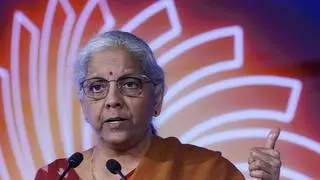In these tough times, with no normal business activity possible, small businesses and start-ups are coming up with innovative ideas and products, both for dealing with the pandemic and for the post-lockdown period.
FMCG company CavinKare has come up with hand sanitisers in ₹1 packs and also introduced a disinfectant brand, Bacto-V, for both gadgets and surfaces. IIT-Madras-incubated start-ups Fabheads Automation and Axis Defence Labs have come up with 3D-printed personal protection equipment (PPE) and face shields made using simple stationery materials.
Tech Plaastic Industrie Pvt Ltd, which makes injection and thermoset injection moulded components for various industries including automotive, has developed a hands-free sanitiser dispensing machine. This was developed primarily for internal use as the company, whose plant is in Irungattukottai to the west of Chennai, had received special permission to open the unit to maintain the machines and moulds. It had to ensure that the workers involved in the work were safe and adopted prescribed practices.
Cost-savings
According to MP Shankar, Director – Operations, Tech Plaastic, the cost of doing business is going to increase once the lockdown is lifted, as enterprises will have to follow stringent hygiene guidelines. To mitigate the cost of investment, the company decided to form teams and focus on frugal engineering. The objective, he said, was to avoid the use of hands for operating the sanitiser dispenser. There had to be no water wastage, the equipment had to be easy to maintain and the target price was ₹5,000 or less.
The team, he said, had seen pneumatic operated dispensers, mechanical dispensers with a number of moving parts. These would cost a lot. Tech Plaastic’s engineers have come up with a product made entirely out of scrap material at the company, which dispenses sanitisers with the press of a pedal with the foot. This has been placed at the entrance of the plant and whenever a worker walks in, he has to clean his hands with the sanitiser, after which his temperature is recorded.
Shankar said the company did not have immediate plans to make this product commercially, but had been getting positive feedback from its customers, who were interested in placing orders. If it decided to go for a commercial launch of the product, Tech Plaastic, Shankar said, would need a team of designers and one for manufacturing.
The key to success was product design — it had to be simple to use, manufacture, ship and assemble on site. The company would require four weeks to convert the prototype into a commercially viable product and would need three months to get the manufacturing systems in place. “The key is to keep the price at ₹5,000 or lower,” said Shankar.
No-touch soap dispenser
Another company, Sreevatsa Stainless Steel Fabrication (P) Ltd, which specialises in architectural applications of stainless steel for buildings and the construction sector, has come up with a no-touch soap and water dispenser, made of stainless steel.

A foot-operated soap and water dispenser developed by Sreevatsa Stainless Steel Fabricators (P) Ltd.
According to CS Srivathsan, Director, Sreevatsa Stainless Steel, the team designed the dispenser in a day and supplied one to the Corporation of Chennai. You press a pedal, the soap dispenser squirts out just the right quantity of soap to clean your hand, while in another bay, the foot-operated water dispenser provides enough water to wash off the soap. The dispensing units can have one or two soap and water dispensing points, depending on what the customer wants.
Sreevatsa Stainless Steel had supplied a few units to the Chennai Corporation, after which it received orders from the Avadi Corporation. Each unit would cost about ₹45,000, but can be made at about ₹28,000 excluding taxes and transportation, if lower grade stainless steel was used, he said. One of these dispensing units had been installed at Ripon Buildings, the Chennai Corporation’s headquarters, for use by the public. The soap dispenser had to be refilled 6-7 times a day and the unit was working satisfactorily, he added.
Srivathsan said the machine would find application in hospitals, hotels, restaurants, IT offices and educational institutions. “We are looking at it as a solution which can meet all requirements for personal hygiene in a post-pandemic world,” he said.
As the cliché goes, necessity is the mother of invention.








Comments
Comments have to be in English, and in full sentences. They cannot be abusive or personal. Please abide by our community guidelines for posting your comments.
We have migrated to a new commenting platform. If you are already a registered user of TheHindu Businessline and logged in, you may continue to engage with our articles. If you do not have an account please register and login to post comments. Users can access their older comments by logging into their accounts on Vuukle.